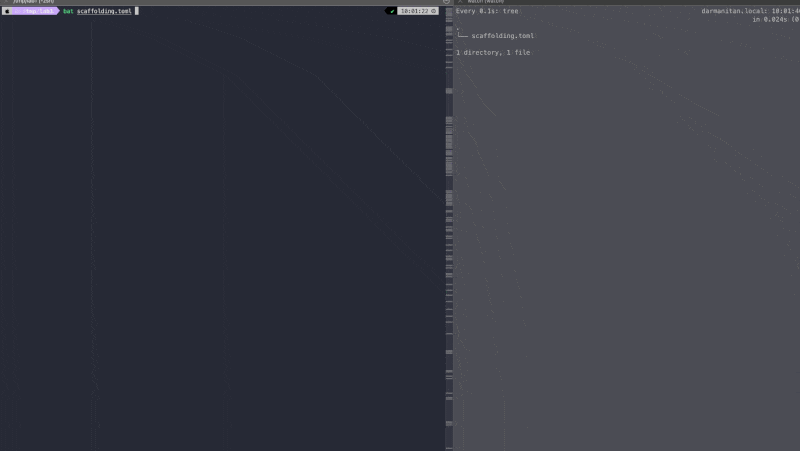9 releases (5 breaking)
| 0.6.0 | Feb 10, 2025 |
|---|---|
| 0.5.0 | Feb 9, 2025 |
| 0.4.0 | Feb 9, 2025 |
| 0.3.1 | Feb 9, 2025 |
| 0.1.0 | Feb 8, 2025 |
#183 in Template engine
280 downloads per month
41KB
663 lines
Scaficionado
Pronunciation: ska·fi·ci·o·na·do, or scaffold + aficionado.
A scaffolding tool to create repeatable project structure using files and scripts from local or remote repositories.
- Files ending in .tera will get templated using tera, otherwise they'll just get copied.
- Files will get generated into a directory called "generated" in the root of where it's called.
- Hooks (shell scripts) can be called before and after each scaffold
Status
Prerequisites
- A scaffolding.toml file (can be renamed if using -c argument). See Configuration Details below.
- Cargo (
curl https://sh.rustup.rs -sSf | sh)
Install
cargo install scaficionado
Usage
scaficionado -h
# Usage: scaficionado [OPTIONS]
# Options:
# -p, --project-name <PROJECT_NAME> The name of the project to scaffold. Overwrites project_name set in configuration file [default: MyExampleProject]
# -o, --output <OUTPUT> The output directory where the generated files will be placed. Overwrites output set in configuration file [default: generated]
# -c, --config <CONFIG> The configuration file path [default: scaffolding.toml]
# -w, --overwrite Overwrite existing files if set. [default: false]. Overwrites overwrite=false set in configuration file
# -h, --help Print help
# -V, --version Print version
# accept defaults
scaficionado
# with flags for project name and output
scaficionado -p MyTestProjectName -o output_scaffolding
# force overwrite existing files in current working directory
scaficionado -p MyTestProjectName -o . -w

Pro Tip
It's hard to spell, so use an alias!
echo "ska='scaficionado'" >> ~/.zshrc
source ~/.zshrc
ska --version
Configuration Details
# Project section (optional)
[project]
# Project name (overwrites default). Overwritten by --project-name argument.
name = "MyExampleProject"
# Output directory (overwrites default). Overwritten by --output argument.
# Warning: using "." will overwrite files in the current directory.
output = "generated"
# Controls whether existing files are overwritten (default: false).
overwrite = false
# Scaffolds array
[[scaffolds]]
# Friendly name for the scaffold (used for logging).
name = "Example Scaffold"
# Repository for scaffold files (local path or remote Git URL).
repo = "../example-1"
# Directory within the repository containing templates (default: "templates").
template_dir = "."
# Template files to process
[scaffolds.template]
# List of files that map source repository files to templated destination files in the output location.
# Destination names can use variables defined below (e.g. {{some_environment}}-{{some_count}}).
# {{project_name}} is a reserved variable that comes from project.name (see above).
files = [
{src = "src1.ext.tera", dest = "dest1/src1.ext"},
{src = "src2.ext", dest = "dest2/src2.ext"},
{src = "src3.ext", dest = "{{project_name}}-{{some_environment}}-{{some_count}}/dest3/src3.ext"},
]
# Hook scripts (optional)
[scaffolds.hooks]
pre = "hooks/pre.sh" # Pre-render hook script
post = "hooks/post.sh" # Post-render hook script
# Variables to inject into the context (optional)
[scaffolds.variables]
some_count = 2
some_environment = "development"
Advanced configuration
You can render an entire directory (recursively) if you want. For example:
[project]
name = "TemplateRepoDirectory"
output = "."
[[scaffolds]]
name = "Local Repo"
repo = "/some/local/repo"
template_dir = "."
[scaffolds.template]
files = [
{ src = "templates", dest = "templates" },
]
[scaffolds.variables]
kind_workers = 3
environment = "development"
It will put the "templates" directory in your current working directory, and any file with a .tera extension will:
- get templated
- have the .tera extension removed
Expanded variables
Expanded variables apply to the dest section of the scaffold, as well as the expanded tera templated file.
- project_name: if used in scaffolding.toml, this path will get expanded (e.g. scaficionado -n TestProjectOne)
- key/values defined under scaffolds.variables (e.g. {{some_count}}) would expand to 2 in the above example
Example configuration
Build from source
cargo build --release
cargo install --path .
Release
To release a new version to Crates.io, tag a new version as vX.Y.Z, matching the version in Cargo.toml.
Some ways to use this
Store scaffolding files in:
~/scaffolding/rust-github.toml
- so you can
ska -c ~/scaffolding/rust-github -o .to generate a useful CI/CD workflow and Makefile.
~/scaffolding/eks-cheap.toml
- so you can
ska -c ~/scaffolding/eks-cheap.toml -o .to generate a quick EKS config for a new lab environment.
Dependencies
~19–31MB
~541K SLoC